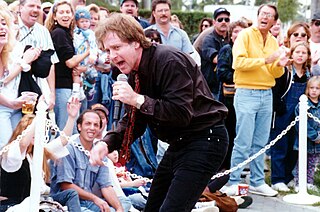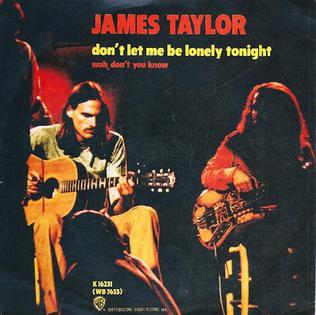
Atlanta Rhythm Section '96 is an album by the American Southern rock band Atlanta Rhythm Section, released in 1996. The album is a re-recording of ARS songs, featuring original members Ronnie Hammond, Barry Bailey, and Dean Daughtry. The album features different takes on the classic songs including more guitar heavy versions of "So Into You" and "Spooky".

"Gonna Fly Now", also known as "Theme from Rocky", is the theme song from the movie Rocky, composed by Bill Conti with lyrics by Carol Connors and Ayn Robbins, and performed by DeEtta West and Nelson Pigford. Released in 1976 with Rocky, the song became part of 1970s American popular culture after the film's main character and namesake Rocky Balboa as part of his daily training regimen runs up the 72 stone steps leading to the entrance of the Philadelphia Museum of Art in Philadelphia and raises his arms in a victory pose, while the song plays. The song was written in Philadelphia. The song is often played at sporting events, especially in Philadelphia. Most notably, the Philadelphia Eagles play the song before the opening kickoff of every home game at Lincoln Financial Field.

"I'm Not in Love" is a song by British group 10cc, written by band members Eric Stewart and Graham Gouldman. It is known for its innovative and distinctive backing track, composed mostly of the band's multitracked vocals. Released in the UK in May 1975 as the second single from the band's third album, The Original Soundtrack, it became the second of the group's three number-one singles in the UK between 1973 and 1978, topping the UK Singles Chart for two weeks. "I'm Not in Love" became the band's breakthrough hit outside the United Kingdom, topping the charts in Canada and Ireland as well as peaking within the top 10 of the charts in several other countries, including Australia, West Germany, New Zealand, Norway and the United States.

"Until You Come Back to Me (That's What I'm Gonna Do)" is a song written by Morris Broadnax, Clarence Paul, and Stevie Wonder. The song was originally recorded by Stevie Wonder in 1967, but his version was not released as a single and did not appear on an album until 1977's anthology Looking Back. The best-known version of this song is the 1973 release by Aretha Franklin, who had a million-selling top 10 hit on Billboard charts. The song reached No. 1 on the R&B chart and No. 3 on the Hot 100 chart in 1974. It became an RIAA Gold record.

"Tonight's the Night (Gonna Be Alright)" is a song written by Rod Stewart, and recorded at Muscle Shoals Sound Studio in Sheffield, Alabama for his 1976 album A Night on the Town. The song, controversial at the time of release, proved to be a massive commercial success and became his second US chart topper on the Billboard Hot 100. It made its debut at number 81 on 2 October 1976 and rose quickly, climbing from number eight to the top of the chart on 13 November 1976, and remained on top for eight consecutive weeks until 8 January 1977. It was the longest stay of any song during 1976, the longest run at the top for a single in the US in over eight years (since the Beatles’ "Hey Jude" in November 1968), and the longest stay at number one for Rod Stewart in his entire recording career, and the final number one of the US Bicentennial year. The song also peaked at No. 5 in the UK, No. 1 for six weeks in Canada, No. 3 in Australia and charted well in other parts of the world. It was the number 1 song on both Billboard's 1977 year-end chart and the year-end Canadian singles chart. It became the best-selling single of 1977 in the United States. As of 2018, it is the 19th-most popular song in the history of the chart.

"Deacon Blues" is a song written by Walter Becker and Donald Fagen in 1976 and recorded by their group Steely Dan on their 1977 album Aja. It peaked at number 19 on the Billboard charts and number 17 on the U.S. Cash Box Top 100 in June 1978. It also reached number 40 on the Easy Listening chart. In Canada, it peaked at number 14, a position it occupied for two weeks, and number 20 Adult Contemporary. In 2021, it was listed at No. 214 on Rolling Stone's "Top 500 Greatest Songs of All Time".

"Don't Let Me Be Misunderstood" is a song written by Bennie Benjamin, Horace Ott and Sol Marcus for American singer-songwriter and pianist Nina Simone, who recorded the first version in 1964. "Don't Let Me Be Misunderstood" has been covered by many artists. Two of the covers were transatlantic hits, the first in 1965 by the Animals, which was a blues rock version; and in 1977 by the disco group Santa Esmeralda, which was a four-on-the-floor rearrangement. A 1986 cover by new wave musician Elvis Costello found success in Britain and Ireland.

The discography of American rock musician Eddie Money consists of 11 studio albums, two live albums, four EPs, and 28 singles. He also released seven compilation albums.

"Heartache Tonight" is a song written by Don Henley, Glenn Frey, Bob Seger and J. D. Souther, recorded by the Eagles and features Glenn Frey on lead vocals. The track was included on their album The Long Run and released as a single in 1979. It reached No. 1 on the U.S. Billboard Hot 100 in November of that year and was certified Platinum by the Recording Industry Association of America representing one million copies sold. It was the Eagles' final chart-topping song on the Hot 100.

"Midnight Rider" is a song by the American rock band the Allman Brothers Band. It was the second single from their second studio album, Idlewild South (1970), released on Capricorn Records. The song was primarily written by vocalist Gregg Allman, who first began composing it at a rented cabin outside Macon, Georgia. He enlisted the help of roadie Robert Kim Payne to complete the song's lyrics. He and Payne broke into Capricorn Sound Studios to complete a demo of the song.

That's What Friends Are For is an album by American singers Johnny Mathis and Deniece Williams, released in July 1978 by Columbia Records. The project was a continuation of the pairing of the artists that began on his previous LP, You Light Up My Life, which included "Too Much, Too Little, Too Late", the duet that was on its way to number one on three different charts in Billboard magazine as the recording sessions for this album got underway.

"Desirée" is a 1977 song written and recorded by Neil Diamond and included as a track on Diamond's 1977 album, I'm Glad You're Here with Me Tonight. The single peaked at number 16 on the Billboard Hot 100 and reached number one on the U.S. Easy Listening chart to become his fifth number one on that chart. The song likewise reached number one on the Canadian AC chart.

"How You Gonna See Me Now" is a song written by Alice Cooper, Bernie Taupin, and Dick Wagner, performed by Cooper and produced by David Foster. It was released on Cooper’s album, From the Inside.

The singles discography of Elvis Presley began in 1954 with the release of his first commercial single, "That's All Right". Following his regional success with Sun Records, Presley was signed to RCA Victor on November 20, 1955. Presley's first single with RCA, "Heartbreak Hotel", was a worldwide hit, reaching the No. 1 position in four countries and the top 10 in many other countries. Other hit singles from the 1950s include "I Want You, I Need You, I Love You", "Don't Be Cruel", "Hound Dog", "Love Me Tender", "Too Much", "All Shook Up", "(Let Me Be Your) Teddy Bear", "Jailhouse Rock", "Don't", "Wear My Ring Around Your Neck", "Hard Headed Woman", "One Night", "(Now & Then There's) A Fool Such as I", and "A Big Hunk o' Love". On March 24, 1958, Presley entered the United States Army at Memphis, Tennessee, and was stationed in Germany. He left active duty on March 5, 1960.

"Don't Let Me Be Lonely Tonight" is a song written and performed by American singer-songwriter James Taylor, from his 1972 album One Man Dog. The song has been included on three of Taylor's greatest-hits collection albums: Greatest Hits (1976), Classic Songs (1987) and The Best of James Taylor (2003). Taylor re-recorded the song for the 2001 Michael Brecker album Nearness of You: The Ballad Book; this rendition won Taylor the Grammy Award for Best Male Pop Vocal Performance in 2002.

The First 25 Years – The Silver Anniversary Album is a compilation album by American pop singer Johnny Mathis that was released in 1981 by Columbia Records. The back cover of the album notes that there are four new tracks. A cover of the Commodores hit "Three Times a Lady" had been released on the UK version of his 1980 album Different Kinda Different, which was retitled All for You, but the Mathis rendition of the song makes its US debut here.

"Imaginary Lover" is a 1978 hit single by the Atlanta Rhythm Section, the first release and greatest hit from their album Champagne Jam.

"So in to You" is a 1977 hit single by the Atlanta Rhythm Section. It was the first release from their sixth studio LP, A Rock and Roll Alternative.

"I'm Gonna Tear Your Playhouse Down" is a song written by Memphis-based songwriter Earl Randle, and first recorded in 1972 by soul singer Ann Peebles. The song was also a hit in 1984 for English singer Paul Young.

The discography of American singer Jody Miller contains 21 studio albums, five compilation albums, one video album, one album appearance, one extended play (EP) and 57 singles. Of her 57 singles, 47 were issued with Miller as the lead artist, two were released as a collaboration, two were promotional singles and five were internationally-released singles.




















